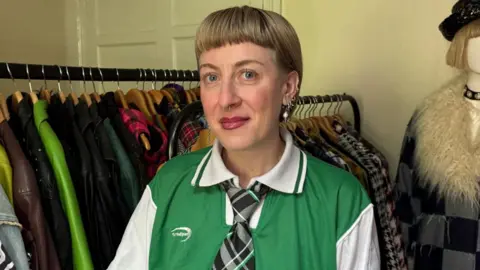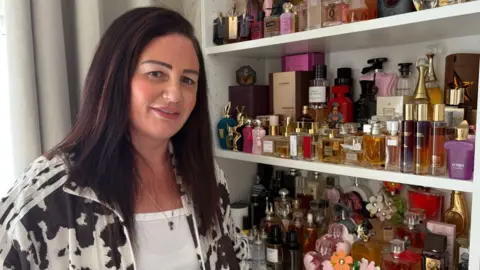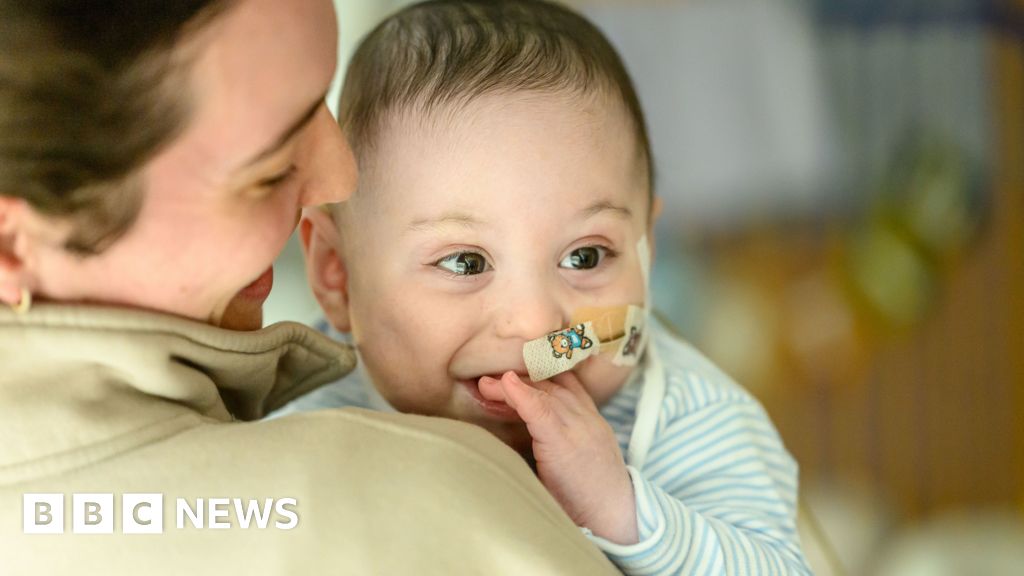 BBC
BBCA day of retail therapy can be just the ticket for some people to help them feel better about themselves. But what happens when you can’t stop shopping?
Surrounded by racks of shirts, dresses and jumpers, Lucy tells me that she could spend up to 14 hours a day searching out new clothes as an escape from reality.
The 37-year-old’s life may sound like a dream, but Lucy is clear that excessive shopping damaged her life.
At one point, Lucy found herself not paying her bills so she could continue to buy clothes.
“It’s like a physical and an emotional drowning. I have felt like I’m just under a weight of clothes constantly,” she says.
Lucy has no idea how many garments she owns, but they take up an entire room in her West Yorkshire home as well as several suitcases – and a 35 sq ft storage unit.
“Clothes acted like an armour to not feel the feelings that I did in real life,” she explains.
Lucy set up a fashion Instagram account and her shopping eventually “spiralled” to the point that she was spending £700 per week – eventually racking up £12,000 of debt.
“It was the first thing I would think about when I woke up.
“You keep looking for clothes in the same way someone might keep drinking because they haven’t quite reached the point of escapism they were hoping to reach,” she recalls as she continues to recover.
‘Penny drop moment’
She says seeing influencers online with copious amount of clothes “normalised” her habits.
It was not until a therapist told her she may have oniomania – the compulsive urge to buy things – that she realised it was possible to be addicted to shopping.
She describes the second in her NHS Cognitive Behavioural Therapy (CBT) session that she heard about the disorder as a “penny drop” moment.
Shopping addiction, also known as compulsive buying disorder or oniomania, is when a person feels an uncontrollable need to shop and spend, despite the negative consequences.
It is not known how many people have it. A review of research suggests it affects around 5% of adults but a more recent study says it may have risen to 10% since the pandemic.
Now Lucy and others across the UK are calling for a better understanding of the condition and for more support from the NHS.
“I think the resources are currently lacking. The research and understanding of oniomania is just not there in the same way as addiction to substances,” Lucy says.

Natalie has what she calls her “cupboard of doom” with more than 10,000 household items in her Rotherham home.
For the 40-year-old, her Obsessive Compulsive Disorder (OCD) “triggers” her to buy certain things – including a particular number of items and colours.
The cupboard is home to 300 tubes of toothpaste and 3,000 washing pods.
“It just escalated to the point where I was going out and just wasn’t settled until my boot was full of stuff,” Natalie says.
At the peak of her addiction, she would be at the shops every day and could spend up to £3,000 a month – including £1,000 on toiletries.
“I cannot stop – and I do not want to stop either. If I see something online, I need it. I don’t care how I get it, I need to get it.”
The mother-of-one recently spent £1,000 while on a flight – mainly on perfumes – and says she has about 400 fragrances, bought in little more than two years.
Natalie, who works in private nursing, says ads have a “massive effect” on her buying habits and she can spend around six hours a day watching perfume videos online when she is not working.
She has undergone therapy both within the NHS and privately, but feels it was not successful as she is not yet ready to stop – but is focused on trying to cut her shopping.
“I think every addiction should be treated the same and more help and therapy should be available [from the NHS] to people who want it,” she adds.
 HANDOUT
HANDOUTThe BBC has spoken to 15 people who feel they have a shopping addiction.
Many talked of a mental toll and feelings of guilt and shame. One said they developed an eating disorder as a result, and another said it became a “monster” in their life.
All felt that social media contributed to their addiction.
According to experts, the proportion of retail sales online has more than doubled in the last decade, up from 12% in May 2015 to 27% in May 2025.
Digital advertising body IAB UK says advertisers’ spend on social media content grew by 20% last year – standing at a total of £8.87bn.
Zaheen Ahmed, director of therapy at The UKAT Group, which runs addiction treatment centres across the country, says they have seen more people with a shopping addiction.
He explains that the hormonal anticipation of a purchase could be equated to the reaction of a drug user securing a hit.
Mr Ahmed says that social media use as part of smartphone ownership is “the new normal”.
“Social media is impacting our lives big time and it is contributing to our urge to buy, urge to spend, urge to interact every time.”
 HANDOUT
HANDOUTShopping became a coping mechanism for issues surrounding Alyce’s self-confidence and esteem.
She started using Buy Now Pay Later schemes when she was aged 18 – a decision she describes as a “gateway” to other credit.
In the end, Alyce, from Bristol, was saddled with debts of £9,000 after spending up to £800 each month on new items, particularly ordering clothes online.
“The more I had to open, the more excitement there was.
“But once I opened the parcels, the buzz would wear off and I’d be sad again – so then the cycle continues.
“Social media is essentially another version of QVC, but one younger generations can watch,” the 25-year-old says.
Alyce, who works in business administration, has since overcome her addiction with therapy and is now almost debt free.
“If I hadn’t done that, I don’t really know where I would be,” she says.
“It does genuinely change your way of thinking and creeps into everything you do – your whole life revolves around payday when you can shop again.
“It just becomes so overwhelming.”
- If you have been affected by the issues raised in this story you can visit the BBC Action Line for more support.
The NHS says it is possible to become addicted to just about anything – but there’s no distinct diagnosis for a shopping addiction.
One reason is because experts dispute how to classify it, with some believing it is a behavioural addiction, while others link it to mood or obsessive compulsive disorders.
Professor of addiction at the University of York Ian Hamilton says shopping addiction has “caught psychiatry on the back foot”.
The expert, who has worked in the field for three decades, said he believes we are still two or three years from the disorder being more widely recognised as a formal diagnosis.
Prof Hamilton says the retail sector has lifted some of the strategies used by the gambling industry to keep people engaged online.
“I don’t think it’s any accident that people find it difficult once they start this loop of spending, buying, feeling good then having remorse.”
The academic adds the rise of influencers is not just a coincidence.
“It’s one thing having an item described to you, [but that] doesn’t have the same impact as seeing a glossy well-put together video package which extols the virtue of an item and only shows the positives.”
Pamela Roberts, psychotherapist at the healthcare provider Priory Group, is clear: “We need to learn different coping strategies but we can only learn [them] when it’s recognised as a problem – and that’s only done when it’s made official,” she adds.
An NHS spokesperson said: “NHS Talking Therapies provides treatment for a range of conditions including OCD and provides practical skills and techniques to help cope.”
They added that anyone struggling with obsessive and compulsive behaviour can contact their GP or refer themselves for therapy.








